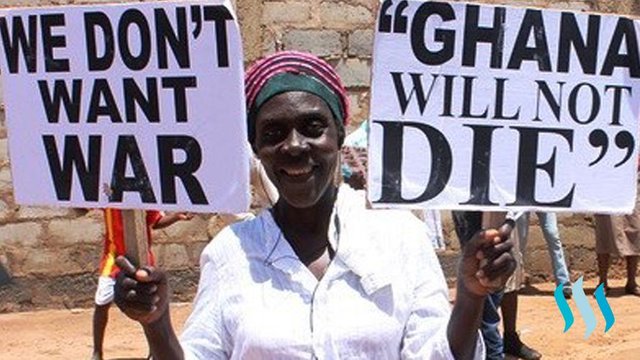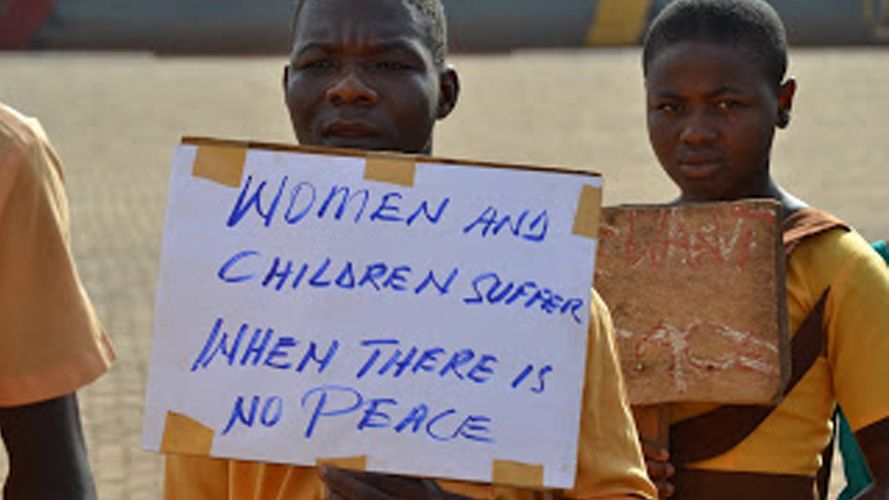War And Peace

In the year 1994 in a market called Nakpayili, close to the Togolese border in the northern part of Ghana, two men were bargaining over a guinea fowl which ended up in an intense misunderstanding. At the end one of the men won the black guinea fowl. The next day the man who lost killed the other man, resulting in a tribal war.

The murdered man was from the Nanumba tribe and the killer from the Kokomba tribe. After the news spread out both tribes started attacking each other’s villages setting up roadblocks to ambush their enemies. After some days four other tribes Nanumbas, Dagombas and Gonjas joined in against Konkombas resulting in 2,000 people losing their life and 150,000 loosing their homes.

The year 2015 also had its own story to tell about an intensive exchange of gunshot over cow meat in Nanumba North district in the Northern region. It was due to some butchers refusing to pay royalties or tributes to the regent of the Nanung Traditional area. The butchers were told by the Regent that any time they kill an animal they should bring a portion of the meat to his palace as royalties or tribute. Its a northern tradition of the Nanumba people paying tribute to chiefs in different forms of either meat or farm product.
We all know about the violence in the Northern regions of #Ghana even when I was little i was scared to go anywhere near the zongo areas which is mostly filled with the northern people in Ghana but looking back at the issue you will realized its a tradition to pay tributes and failure to do so leads to loss of lives and property. often most of these violence's are unjustifiable and keeps you wondering what causes them. Could it be that the people, Ghanaian's and non-Ghanaian's, do not understand the culture and tradition of the people in the northern region or the northern people are just violent prone?
Areas such as Mamprugu, Dagbon, Nanung and Gonja the kings plays leadership roles in their kingdoms by partaining in the payment of royalties and tributes which is also known as taxes, used during colonial and post colonial era. this served as a medium of unity among the people. The people’s of the land, headmen, village chiefs, sub-chiefs and divisional chiefs who visited their king were imposed to present a gift to the King. And also in Mamprugu, the Tara Naa was entitled to a portion of any gift the Nayiri received which is also part of the law.
When visiting an elderly person one must not go empty handed. it was a pre colonial era tax rule example is Dagbon who for instance had evolved a complicated tax system that nurtured Kingship. Before the Europeans arrived there was a system where by royalties and tributes will be provided from the people to the local chiefs, from the local chiefs to the divisional chiefs and from the divisional chiefs to the King. at every stage of the procedure part of the tributes were retained, This practice was done in all the Mamprugu, Dagbon, Nanung and Gonja Kingdoms.
In Gonja the royalties are paid to the cheifs in sequence. Village headmen pays royalties or tributes to clan chiefs, clan chiefs pays royalties or tributes to the divisional chiefs, the divisional chiefs also pays the tribute to the Yagbon Wura who is the Overlord of Gonja Kingdom. they is a need of Kpembi Wura to pay royalty to the Yagbon Wura on any GonjaNation festival.
Dead animals which are found in the bush at the Gonja society belongs to the village headman or chief. Any Tusk of any elephant found dead was sent to the chief and the hunter will keep the other portion. The meat of one of the hind legs of any big animal killed by a hunter such as a Buffalo or elephant or antelope will be given to the Gonja Chief. An elephants Tusk, ears and meat of one thigh of the animal was sent to the chief. The sending or offer of the Tusk and ear lying on the ground was significant. It is an acceptance of the fact that the land belongs to the chief. The elephants ears were used to cover the talking drums of the chief and he was not suppose to be given a legs of small animals, that portion were given to smaller chiefs. It also shows the power entailed in the Kingship. By a mere violation to pay royalties or tributes shows that his reign was not being recognized.
If you like posts like this would you please follow me here on #steemit @kofpato and up-vote post!

This blog is mentioned in
Dank je broer @jackjohanneshemp
your welcome